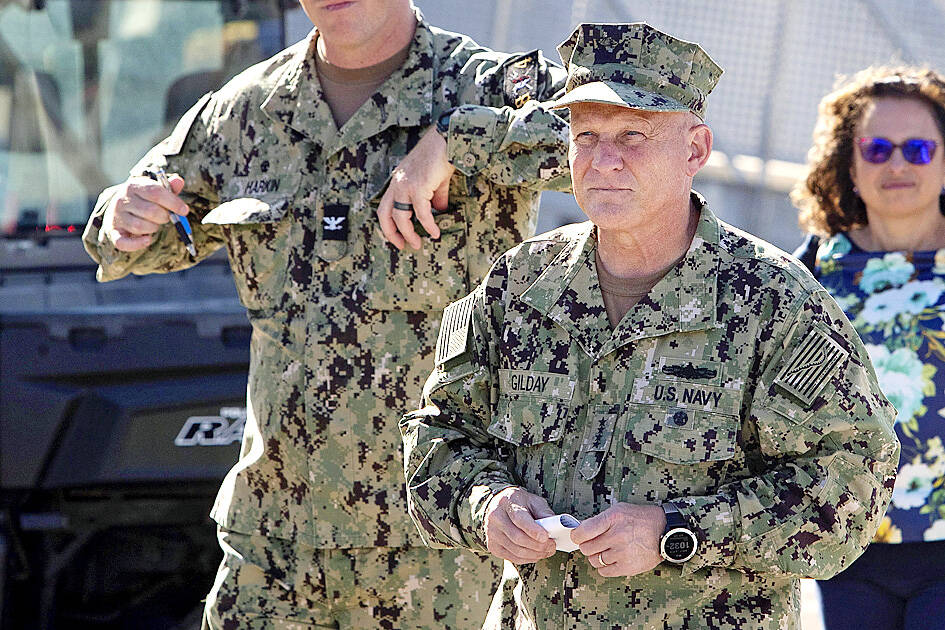Forty-three percent of Americans view the tensions between Taiwan and China as a “very serious problem” for their country, the results of a survey released on Wednesday by the PEW Research Center showed.
Taiwan-China tensions were the third-most concerning issue among Americans, with 82 percent of respondents saying the tensions were “serious” or “very serious.”
The only two more concerning issues for Americans were the partnership between China and Russia (87 percent), and China’s military power (86 percent), the poll found.

US Admiral Michael Gilday is pictured in Cadiz, Spain, on Aug. 17.
Photo: EPA-EFE
Fifty percent of respondents said China’s military power was a “very serious” concern, an increase of 7 percentage points from a similar survey conducted in March.
Compared with the March survey, the percentage of Americans who said tensions across the Taiwan Strait were a “very serious” concern for their country also rose by 7 percentage points.
Americans were apparently less concerned about Chinese President Xi Jinping (習近平) securing a third term during the National Congress of the Chinese Communist Party (CCP), with 41 percent saying it was a “serious” issue and 30 percent saying it was “very serious.”
Amid rising concerns over tensions across the Taiwan Strait and China’s growing military power, 54 percent of respondents said Washington should prioritize visits by high-level US politicians to Taiwan at the expense of bilateral ties with China, compared with 38 percent who opposed the idea.
The center surveyed 5,098 adult Americans from Oct. 10 to Sunday.
The results of the US survey are in contrast with a survey among Taiwanese conducted by the Taiwanese Public Opinion Foundation, the Chinese Association of Public Opinion Research and Convergence Media in the two weeks following US House of Representatives Speaker Nancy Pelosi’s visit to Taiwan in August.
That poll showed that 60 to 78 percent were “not worried” about large-scale live-fire military drills Beijing conducted around Taiwan following Pelosi’s visit from Aug. 2 to 3.
Separately, a senior US admiral said the US military must be ready to respond to a potential invasion of Taiwan as early as this year, signaling heightened alarm over Beijing’s intentions toward Taipei.
US Chief of Naval Operations Admiral Michael Gilday is the latest senior official in Washington to raise concerns that Xi might be much more willing than previously thought to seize Taiwan.
His comments came as Taiwan’s top security official warned any attempt to invade the nation would fail and turn China into an international pariah.
Xi is on the cusp of securing a third five-year term at the helm of the world’s most populous nation, delivering a landmark speech at the CCP National Congress on Sunday where he restated his vow to one day “reunify,” or forcefully take, Taiwan.
In a discussion with a think tank, Gilday was asked about Xi’s speech and whether he agreed with comments by another US admiral that Beijing would be ready to take Taiwan by 2027.
“It’s not just what President Xi says, it’s how the Chinese behave and what they do,” Gilday told the Atlantic Council. “And what we’ve seen over the past 20 years is that they have delivered on every promise they’ve made earlier than they said they were going to deliver on it.”
“So when we talk about the 2027 window, in my mind, that has to be a 2022 window or potentially a 2023 window,” he added. “I can’t rule that out. I don’t mean at all to be alarmist by saying that. It’s just that we can’t wish that away.”
The CCP has never controlled Taiwan. Taipei is not a treaty ally of the US, but the US Congress is bound by law to sell Taiwan defensive weapons and there is bipartisan support for protecting what has become a progressive democracy and vital global trade partner.
Beijing’s stance has long been that it seeks “peaceful reunification” with Taiwan, but reserves the right to use force if necessary, especially if the nation formally declares independence.
On Monday, US Secretary of State Anthony Blinken said that Beijing wants to seize Taiwan “on a much faster timeline” than previously considered, adding that “a very different China” had emerged under Xi.
Blinken also said that any war over Taiwan would have an “enormous” impact on global trade.
Additional reporting by AFP
Source: Taipei Times - 2022/10/21




















